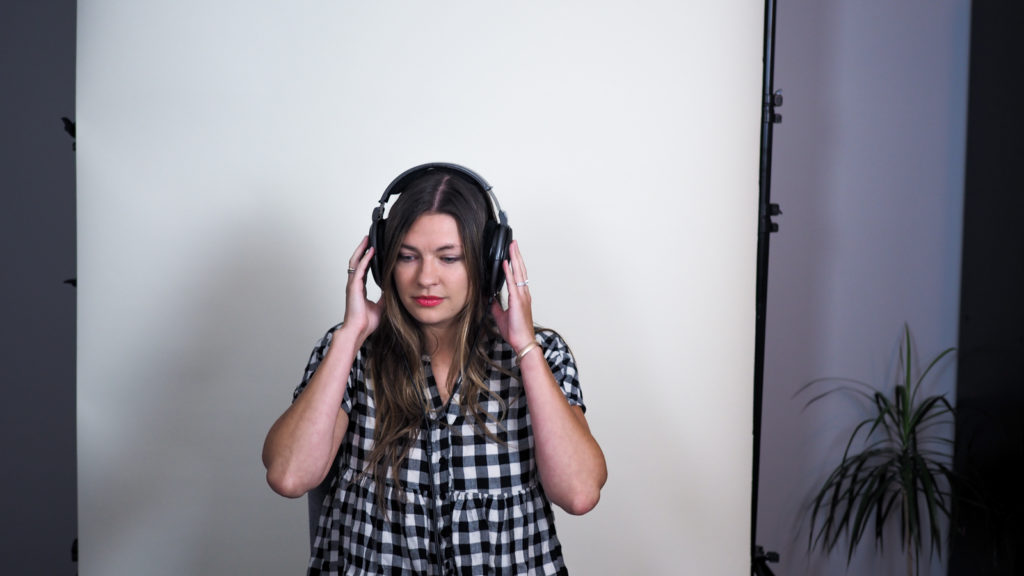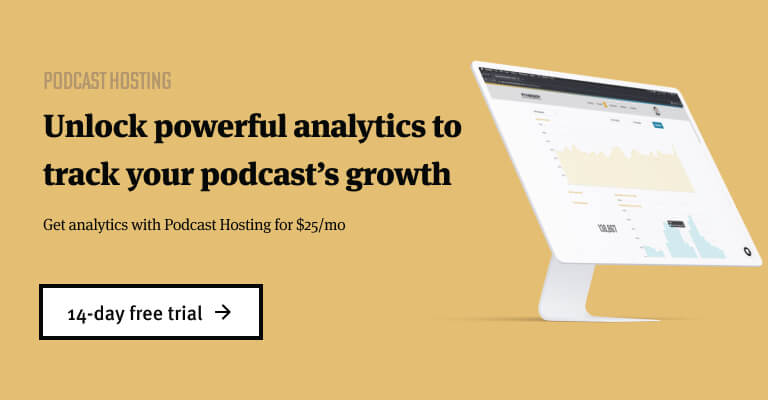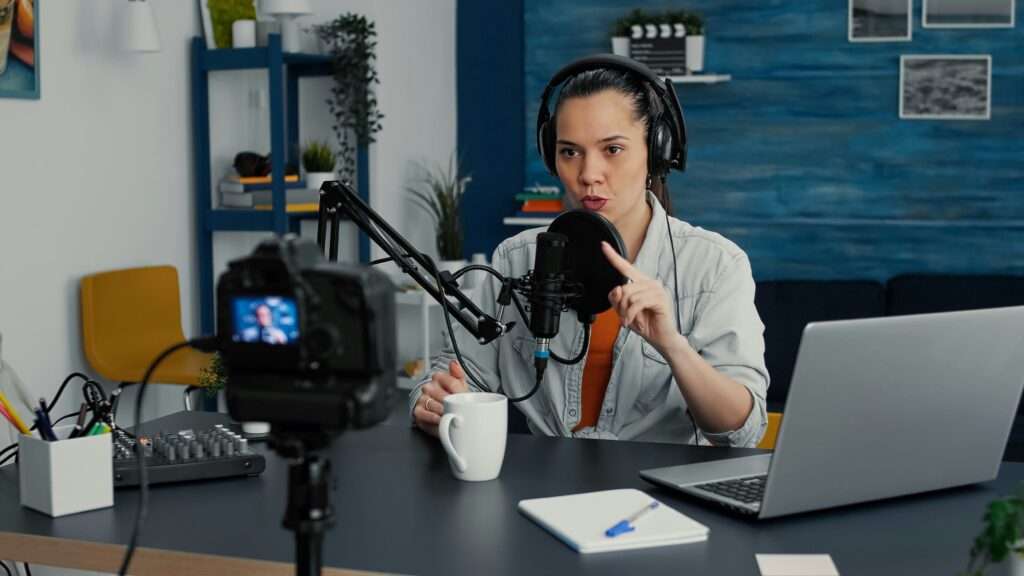Making money on your podcast is a dream goal for so many of the podcasters we meet.
Monetizing your podcast can help you pay for the costs of hosting and post-production, and can work as some passive income to help save up some extra money for the future.
But how do you do it? We outline 10 methods in this blog, and there are always new and innovative ways to do it. But the truth is that this isn’t easy. Everything worthwhile takes time, and it’s no different with building a podcast with a dedicated audience and monetizing it. So let’s dive in and see how to make it happen.
Affiliate sponsors
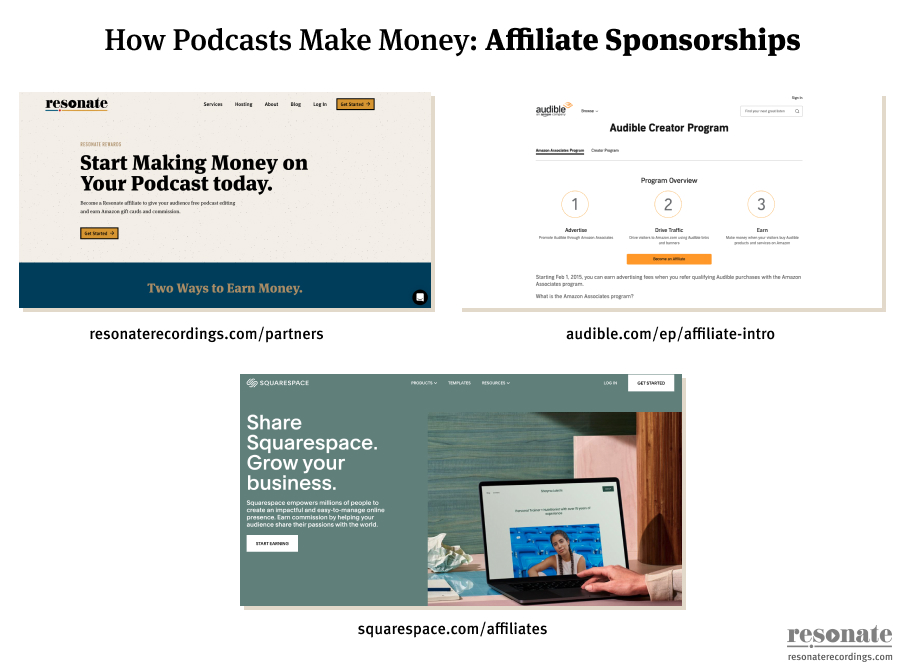
Affiliate sponsorships are a great first step towards creating revenue because you can get started for free and you don’t need to have a large audience in order to set up affiliate accounts.
What is affiliate marketing for podcasts
Simply put, affiliate marketing is recommending a product or service to your audience and being paid a portion of the revenue for each new lead that you refer to that brand.
For example: “This episode is brought to you by Resonate Recordings. Get one free episode of podcast editing at Resonate by using our link: resonaterecordings.com/tim-ferris”
[Sign up to become a Resonate affiliate partner here]
How to use affiliate sponsors to monetize a podcast
So how do you start? Ideally, there is a product or service that you already genuinely like and would recommend to your audience through an affiliate program. So think about what you like, what your listeners will like and what would be a good fit based on the nature of your podcast. No one will know your audience better than you, so think about what will make sense for them and start creating some ideas of people to approach. As you’re thinking about how to approach affiliates, present the idea of adding in a simple shoutout into your podcast that will advertise their product, serve or podcast.
How to find affiliate sponsors
A quick Google search will reveal dozens of lists of affiliate programs in every possible industry and niche. But we’ll share some of our favorite affiliate programs below so you can get started quickly.
There are two main ways to find affiliate programs:
- Going directly to a company with an affiliate program (eg Resonate Rewards)
- Signing up for an affiliate network that will connect you with multiple programs (ShareASale).
Shortlist of affiliate programs
- ShareASale (Affiliate Network)
- CJ (Affiliate Network)
- Resonate Rewards
- Buzzsprout Affiliates
- Amazon Associates
- Amazon Audible
- Squarespace
- Kinsta
How to promote your affiliate links
Once you sign up for affiliate programs, you will typically receive a unique referral link (eg https://kinsta.com/?kaid=UYDRDZYWTQDE) that you can share with your audience.
How to share your link:
- Podcast intro and outro
- Podcast show notes & episode descriptions (add hyperlink for people to click from Apple, Google, and Spotify)
- Social media (Facebook, Instagram bio, Twitter, LinkedIn)
- Podcast website
- Email signature
- Interview someone from the company you are referring
Pro tip: Create a memorable link (resonaterecordings.com/culpable) and redirect it to your affiliate link. This will make it easier to share your link in your podcast intro and outro, and make the call to action easier for your audience to follow.
The most important thing when it comes to affiliate marketing is offering genuine recommendations to your audience. Trust is critical if you want your audience to take action, click your link, and spend their hard earned money on your recommendations.
Whatever platform you use, make sure you test out the product or service and give an honest review to your audience before you promote the link.
Programmatic advertising
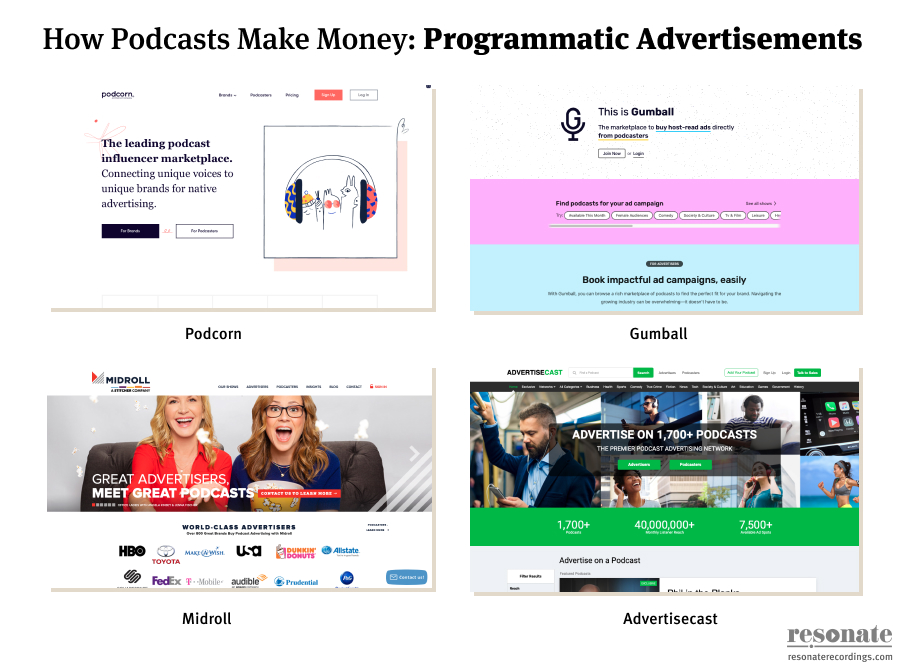
Another option for your monetization could be programmatic advertisements.
What is programmatic advertising
Programmatic Advertising is when a brand pays for ad placements in your podcast episode. This is simply you selling “air time” on your podcast to a company or brand that values that space as a potential way of getting in front of potential customers. These ads are the more traditional method of monetization as they function like television and radio advertisements yet can be incredibly successful.
Podcast ads are typically sold on a CPM (cost-per-thousand) basis. The most recent industry standard CPM, according to Advertisecast, is $18 for a 30-sec add and $25 for a 60-sec add.
So you can get a feel for how these numbers work, let’s walk through a hypothetical example.
Example: If you have 5,000 downloads per episode, and you record 2 pre-roll ads (60 secs each) plus 1 midroll ad (60 secs), you could generate $375 each episode of your podcast. Over the course of a standard season (12 episode average), you could generate $4,500.
- 2 pre-roll ads (60 secs each) = $50
- 1 mid-roll ad (60 secs) = $25
- 5 x $75 = $375 (5,000 listeners)
- $375 x 12 episodes (average season length) = $4,500
There are two general formats for podcast ads:
- Baked-In Ads – Ads pre-recorded in your podcast episode that are “baked in” with the rest of the podcast episode
- Dynamic ad insertion – Audio files that are automatically inserted across multiple episodes of a podcast, which can run temporarily, and easily be swapped out and replaced
Podcast ads are generally placed in 3 different sections of your show:
- Pre-Roll – The beginning of your episode
- Mid-Roll – The middle of your episode
- Post-Roll – The end of your episode
How to use programmatic advertising to monetize a podcast
- Grow your podcast audience to a minimum of 1,000 listeners per episode (many advertising platforms will require more to get started)
- Connect to advertisers through an agency (Advertisecast, Midroll) or sign up to a self-service platform (Gumball, Podcorn).
- Pitch your podcast to advertisers
- Once you find a sponsor, record the ads and run your episodes
- Earn money while you sleep
YouTube Partner Program (YPP)
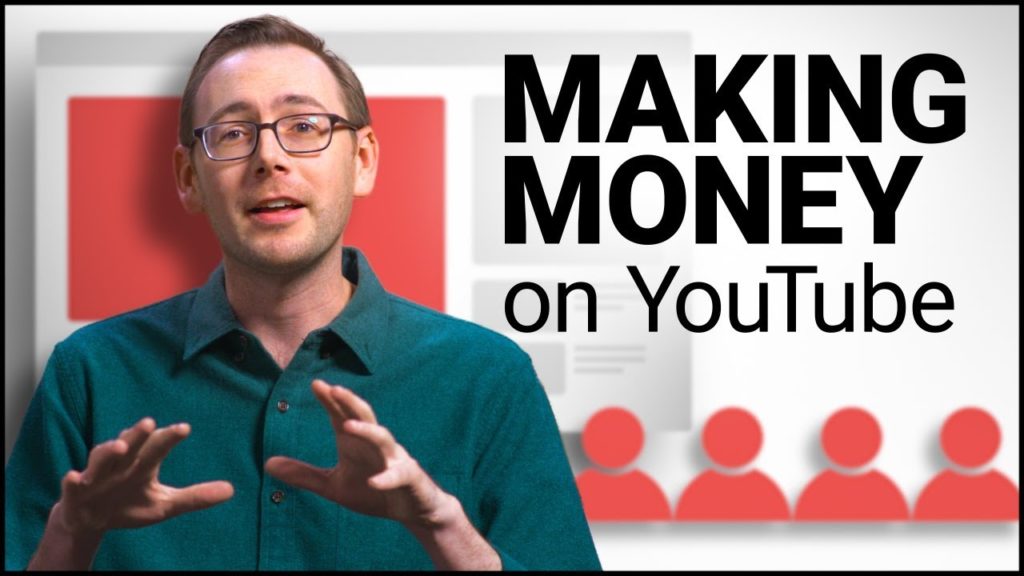
Image from YouTube
What is the YouTube Partner Program
The YouTube Partner Program (YPP) allows content creators on YouTube to generate income from engagement on their videos, using several different features:
- Ad revenue (most common)
- Channel memberships (similar to Patreon)
- Merch shelf
- Super Chat & Super Stickers
- YouTube Premium revenue
YouTube has a fairly high barrier to entry. All creators must be manually approved for YPP, and at the minimum you will need to have 1,000 subscribers.
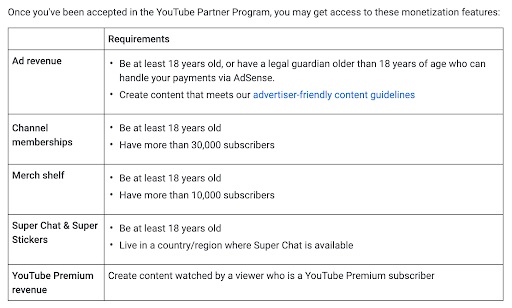
Image from YouTube
How to use the YouTube Partner Program to monetize a podcast
Here are the steps you will need to follow to start earning money on YouTube:
- Grow your channel to 1,000 Subscribers
- Get 4,000+ public watch hours within 12 months
- Link your Google AdSense account to YouTube (see steps here)
- Follow YouTube’s content monetization policies
As you can see, this process takes time. But if you are in it for the long-term, this can pay off very well. YouTubers make an average of $5 per 1,000 views. However, YouTube takes 42% of all earnings from YouTube AdSense. So if you make $100, for example, you will only take home $68.
Podcast memberships
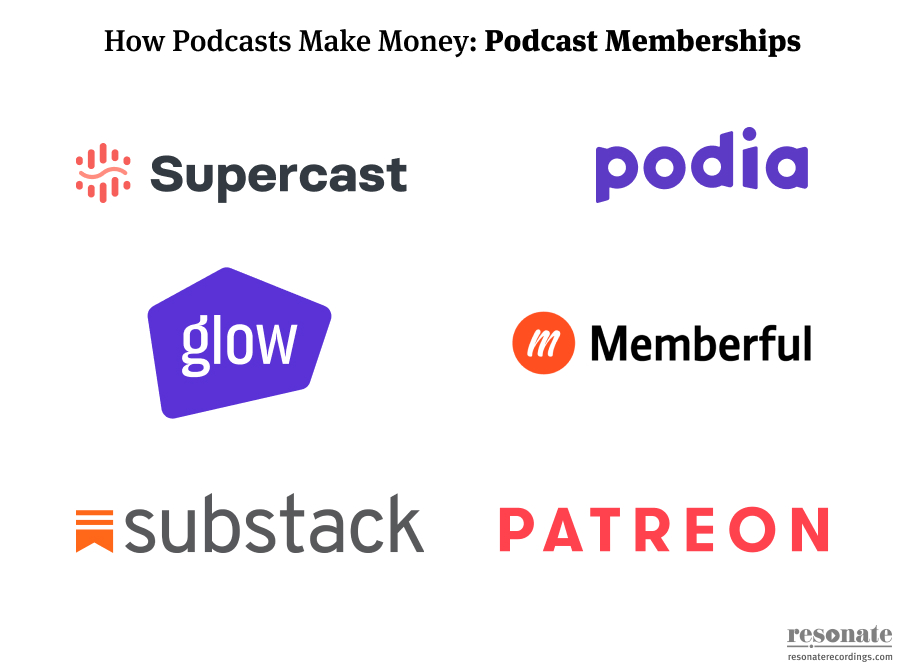
What are podcast memberships
Membership podcasts are private podcast episodes that hosts create for their paying subscribers. Typically, fans sign up for a monthly subscription to access the content on a unique RSS feed or a password-protected website.
One important note to make is about the word “Subscribe.” The podcast industry is transitioning from using the word “subscribe” (for free) to using the word “follow” instead. What this means is that in the long term, you should ask your audience to “subscribe to my podcast” if it’s a paid membership, and “follow my podcast” if it is a free podcast they can get on Apple, Spotify, etc.
Here are a few examples of the type of private podcast you could create:
- Ad-Free Podcast
- Secret Podcast – A separate spin-off to your main podcast, available exclusively to members.
- Extended Interviews – Post extended interviews and “off the air” conversations for members only.
- Q&A Episode – Field questions from your paying subscribers and record an exclusive episode in response, giving shoutouts to the people who ask.
- Educational Course – Sell knowledge and experience through an audio-only exclusive course
Membership podcasts are an incredible way to serve your most loyal audience with higher quality content. Plus, there are so many tools being built to support this model that it’s even easier to set up than ever.
How to create a podcast membership
Supercast
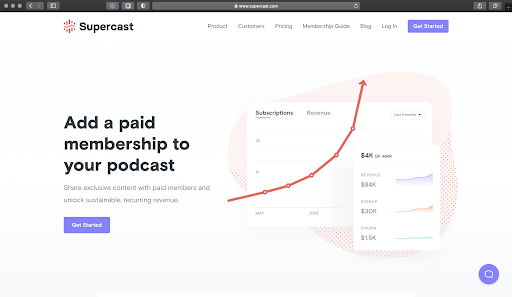
Supercast is built specifically for turning your podcast into an exclusive podcast membership. This platform is built specifically for creating your own podcast SaaS company. It comes with beautiful analytics (MRR, churn, location of your users, etc), a customizable landing page for users to sign up, Apple and Google Pay integrations for your listeners to easily subscribe, and an affordable rate of .$59/user/month (plus Stripe processing fees).
Supercast stands out because they are built exclusively for podcasters, they have incredible Saas analytics, and they even monitor RSS feed security and notify you if any of your audience is illegally sharing your paywalled content with others.
Glow
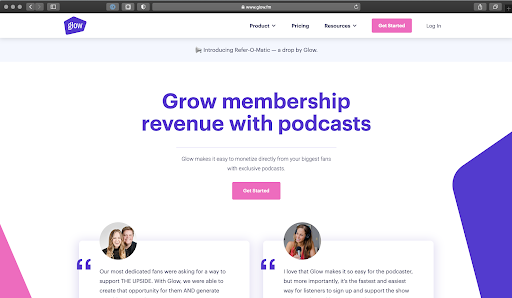
Glow lets you create memberships for your podcast. With Glow you can create a full membership program, complete with courses, a private community, members-only email newsletters, merch, and also create a paid private podcast. Glow manages monthly payments for you automatically, and lets you automatically add and remove subscribers from your private podcast audience through Zapier. They do not publicly share their prices, aside from their standard card processing fees, but instead ask you to call to learn more.
When you create a membership podcast on Glow, they manage your podcast hosting, offering up to 150,000 downloads per month.
Patreon

Patreon laid the groundwork for this recent movement of creators monetizing their creativity directly from their audience. Patreon serves creators in every field, and they let you create a community for posting exclusive audio, video, and posts, get feedback from your audience, and monetize your creativity. Patreon’s private rss feed feature lets you create a unique rss feed for each individual patron that signs up for your exclusive podcast.
Patreon functions around a “tiers” system. Most creators make at least 3-4 tiers for their Patreon community and each tier unlocks more exclusive features. You can start an account for free, but they make money off of all the revenue you generate, taking 5% (Lite), 8% (Pro), or 12% (Premium) depending on which plan you choose.
Substack
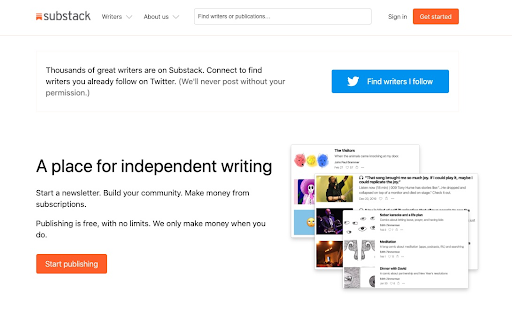
Substack is a fast-growing platform for independent writers and thinkers who want to earn money through a subscription content model. And while this platform is predominantly for written content, they have rolled out a feature for paywalled podcast content as well.
Substack is quick and easy to set up. It gives you a website that will house all of your content and allows you to manage your podcast and your email newsletter in one streamlined platform. One thing to note that is different about substack is that by using your platform for podcasting you are actually using them as your podcast hosting platform. You can set up a new show on their platform or migrate your RSS feed from your current platform onto Substack.
They make their money by taking a 10% cut from any revenue you make on the platform. But in exchange, you get free podcast hosting, an email newsletter platform, and a website with archives for your posts. You can learn more about how Substack’s private podcasting works and see examples here.
Memberful
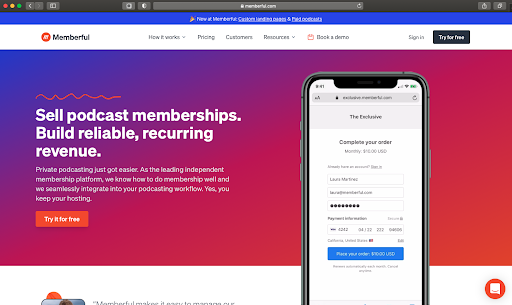
Memberful is a membership platform for podcasters, content creators, educators, and really everyone. They have tools that allow you to create a membership podcast, course, newsletter, community, and gated content. Memberful’s private podcast feature is different from Supercast, Glow, and Substack because you can bring your own RSS feed to this platform and only use it for membership payment and management. As long as your podcast host can make your podcast private, blocking it from being searchable in podcast directories, you are able to use Memberful with a separate podcast host. They also have a feature to give your audience a free trial.
They also have a WordPress plugin that means you can add memberships to your podcast website in minutes. You can start a private podcast on Memberful with their free plan, which takes 10% of your revenue, or get more features for $25/mo (Pro) or $100/mo (Premium).
Podia
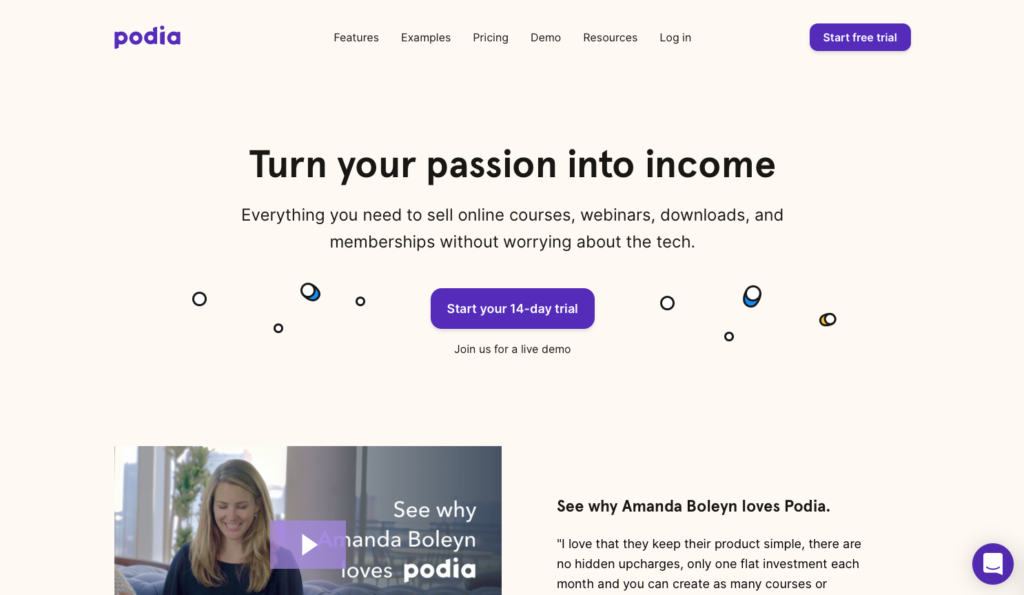
Podia is an all-in-one digital membership platform for selling your private podcast, digital products, courses, and email newsletters. Because it offers so many features, this platform is perfect for podcasters who plan to branch out in what they offer their audience over time (eg. publishing a course or Ebook).
Podia is incredibly powerful because you can unlock a full-feature platform for creating an online business by signing up for one account. The main downside is the price. Creating a subscription podcast on Podia will require their more expensive plan which costs $79/mo. What I love about the platform, however, is that they take 0% of your your recurring revenue. If you are thinking long-term, this is a much better option than sharing a percentage of your revenue like all of the other platforms I just listed above.
Examples of podcast memberships
Here are some examples of podcasts that are generating recurring revenue by hosting a subscription podcast.
- Stratechery (Built on Supercast)
- Dithering (Built on Supercast)
- Found My Fitness – Aliquot podcast (Built on Supercast)
- The Qualys Podcast (Built on Supercast)
- 20k Hertz (Built on Glow)
- The No Sleep Podcast (Built on Glow)
- Matt D’Avella’s The Secret Podcast (Built on Patreon)
- Creative Pep Talk Podcast (Built on Patreon)
- Sh!tpost (Built on Substack)
- Foreign Exchange (Built on Substack)
- Historic.ly (Built on Substack)
- Inside the Newsroom (Built on Substack)
- Relay FM (Built on Memberful)
- Megamaker course by Justin Jackson (Built on Podia)
How to use memberships to monetize a podcast
- Decide on the concept for your private podcast
- Create an account on Superast, Patreon, Substack, Memberful, or Podia
- Market your exclusive content on all your owned media (social media, YouTube, email newsletter, website, etc)
- Publish content to serve your audience with genuine value
- Start earning monthly revenue from subscribers
Premium podcast apps
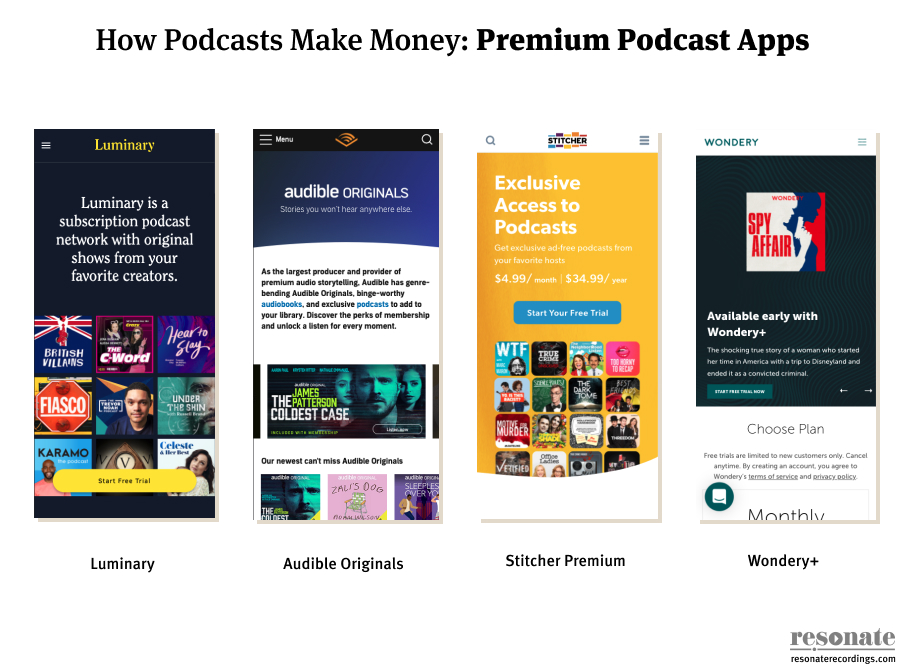
What are premium podcast apps
Another option for making money from your podcast is to offer your podcast on a premium podcast subscription service such as Luminary, Audible Premium, Wondery Plus, or Audible Exclusives. Premium podcast apps offer listeners perks like ad-free episodes, early access, and exclusive shows for a monthly subscription cost.
Because premium podcast apps are built on the use of exclusive content, they are by nature much harder to get into and monetize than some of the other options in this blog. However, they may be a good fit for your podcast if you are looking to play the long-term game, and you believe you have exclusive content that you want to pitch to a platform.
Best Premium Podcast Apps
How to use premium apps to monetize a podcast
Premium apps like Luminary are built on exclusivity, so they are hard to get into. But if you’re a larger organization looking to develop exclusive original content, it may be worth the hard work and time investment to make a massive impact.
How to submit a podcast to premium podcast apps
Below are the basic steps it takes to submit your podcast to the top premium podcast apps.
How to submit a podcast to Luminary
- Submit your podcast to luminary at submissions@luminarypodcasts.com
- Follow the guidelines for submission in this article
- Wait for Luminary to manually approve your podcast
How to submit a podcast to Wondery Plus
- Develop a pitch for your exclusive podcast idea
- Fill out the Contact form on the Creators page
How to submit a podcast to Audible Originals
- Develop a pitch for your exclusive podcast idea
- Submit a pitch to the Audible Podcast Development Program
Conferences, events, and consulting
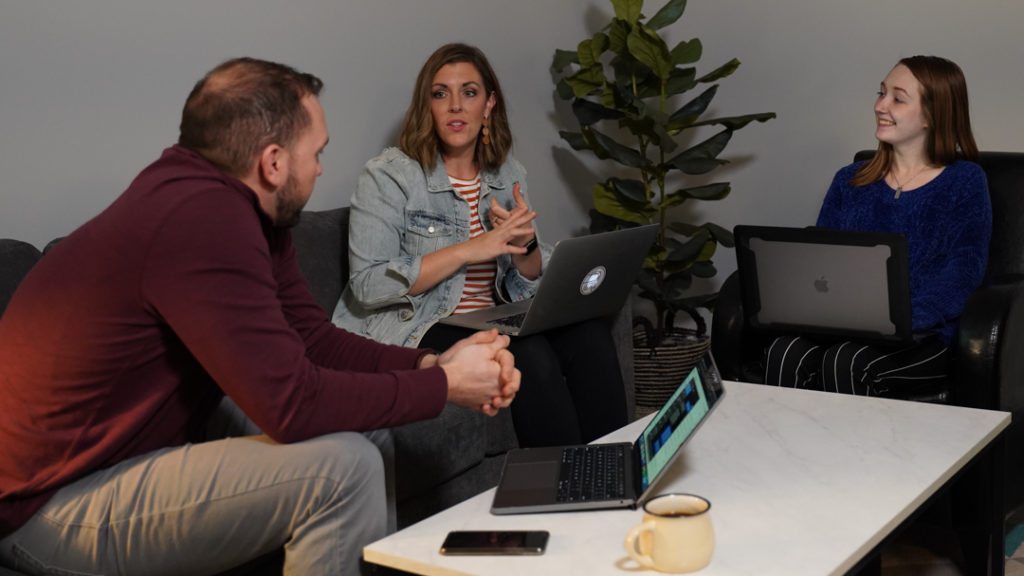
Hosting a podcast is a powerful way to establish yourself as a key leader and voice in your industry. Public speaking isn’t for everybody, but it’s a powerful opportunity for many. Now, we need to be clear, you aren’t going to get $5,000 speaking opportunities at the biggest conferences immediately just because you have a podcast. It’s not that easy. But there is more than money at play here. Oftentimes, if you are able to book a speaking engagement, you’ll have your travel expenses covered (even if you don’t get a stipend). And on top of having no out-of-pocket expenses, you’ll get the opportunity to reach a whole new audience with your message.
You can leverage your podcast to get on stage in front of a new audience, and standing on stage can get you more podcast listeners. This is the compound growth of marketing and monetizing your podcast.
Another way to leverage your voice and expertise from your podcast is to offer paid consulting services to your listeners. If your listeners really believe in your message and develop trust in you, then selling a consulting service will be super easy. The first step to earning this trust, of course, is becoming an undeniable expert in your field or niche.
Examples of podcast conferences and events
There are hundreds of conferences and events that you can speak at to grow your podcast audience. There are niches on niches on niches. To get started, we’ll list out a few of the best conferences to look into within the podcast industry niche.
How to use conferences and events to monetize a podcast
One excellent example of this strategy is Andy Miller, host of the Creative Pep Talk podcast. He started the podcast to hone his speaking skills and develop compelling keynote speeches. Since then, he has gone on to speak at Creative Mornings, Maryland Institute College of Art (MICA), and more. His podcast was the springboard for developing both his skillset, content, and credibility that has gone on to empower his career as a speaker (alongside his main expertise as an illustrator).
Here’s how to get started:
- Start a podcast to develop your message, speaking skills, and build a portfolio
- Develop a message and record it as a podcast
- Submit your podcast to conferences and speaking opportunities
- Use your speaking engagements to hone your podcast, and your podcast to hone your speaking engagements
- As you gain skill, experience, and a portfolio, you can begin to charge for your time as a speaker
While the path to monetizing your podcast through speaking engagements is not linear at all, it does correlate very well to the medium of podc\asting. Being a host of a show developing powerful speaking skills that deserve to be monetized. So think of hosting your podcast as an investment in your own unique skillset, and as you hone your craft and put yourself out there, opportunities will come with time.
Courses
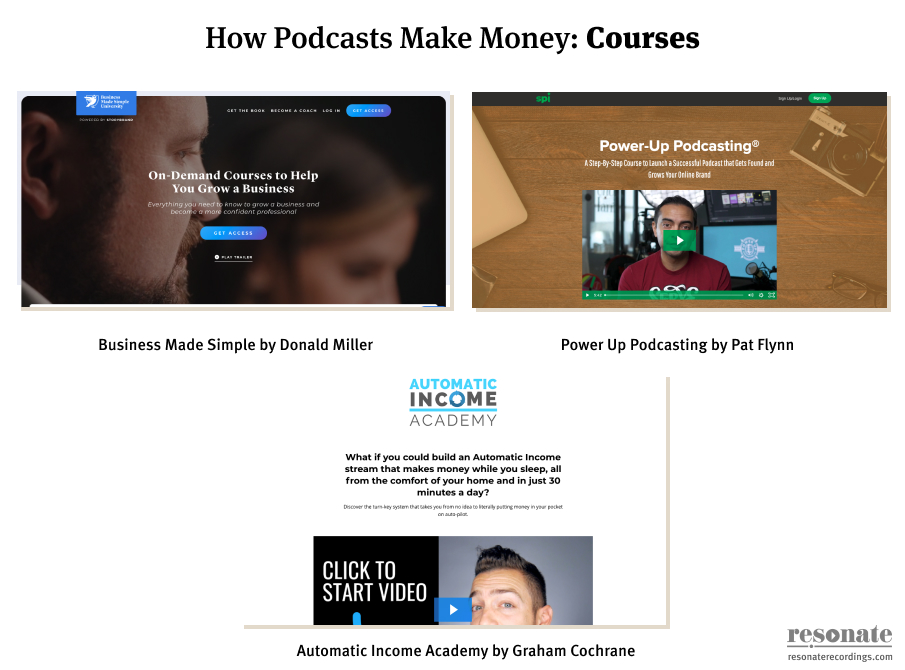
Selling courses online is an increasingly popular way to monetize your brand. Podcasters, YouTubers, bloggers, universities, and influencers from all walks of life are creating their own “Masterclass” courses and selling them to their audience to generate passive income.
Courses come in all different forms. Most commonly, courses include videos, written summaries, assignments, resources, and a dedicated community. The most common thing to do is to use your podcast to push your audience to pay for your course. The best way to market content from the course is to give your audience a taste of the content, the experience, and what they are going to get from it within your free podcast.
Examples of podcast courses
- Business Made Simple (Donald Miller) – The Business Made Simple podcast is free content marketing pointing their audience to sign up for the paid course
- Power Up Podcasting (Pat Flynn) – This course from Pat Flynn walks through everything you need to start a successful podcast, from the podcast veteran himself. Pat is a highly trusted voice in the podcast space, and while he doesn’t explicitly have a podcast that markets this course, all of his marketing is somewhat intertwined as he mentions his courses and businesses throughout channels like his Smart Passive Income podcast.
- Automatic Income Academy (Graham Cochrane) – Graham Cochrane is a trusted voice in the audio production space and has built a successful solo career through The Recording Revolution. Now he is sharing his lessons in business on The Graham Cochrane Show, and his website offers both a free passive income workshop and a paid Automatic Income Academy course for $497.
- Make Creativity Your Career (Skillshare Class by Andy J. Miller) – Andy J. Pizza, host of the Creative Pep Talk podcast, has created multiple courses on Skillshare, one of the sponsors of his podcast. This is yet another way he is able to monetize his show, on top of his Patreon account and in-show sponsors like Skillshare and Astropad.
How to use courses to monetize a podcast
There are several different ways to create and monetize a course online. Below is a short list of the best platforms you can use to create yours.
How to create a course
- Choose your niche
- Write your content
- Record videos, produce content, edit videos
- Choose your course platform (eg Podia) and sign up
- Upload your course content
- Market your course within your podcast (while developing your content and after)
- Publish one of your courses as a free episode of your podcast to market the grow interest
Crowdfunding and donations
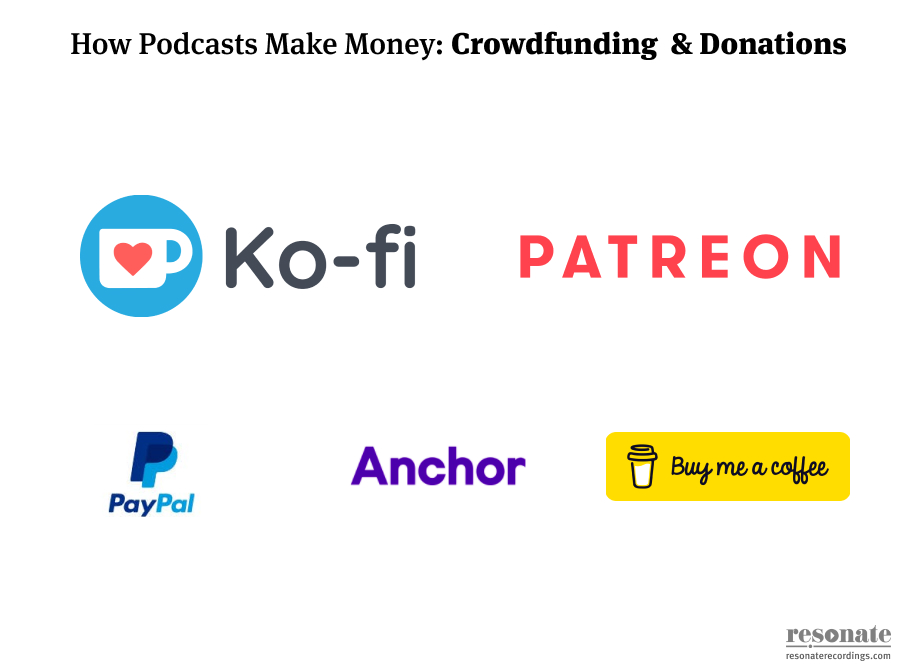
What is crowdfunding?
Crowdfunding for your podcast is collecting direct donations from your podcast audience, whether as a result of offering bonus content or simply by asking for them to support the show if they love your content.
The most popular ways to crowdfund for your podcast are Patreon, Ko-Fi, Buy Me a Coffee, Anchor, and Paypal. There are a ton of different strategies for crowdfunding, and that creativity and freedom is one of the reasons we love this method of monetizing your podcast.
Here are some of the best crowdfunding tools:
Examples of crowdfunded podcasts
- What’s Good Games (Patreon)
- Retronauts (Patreon)
- Roxanne Richardson (Ko-Fi)
- Olga Zalite (Ko-Fi)
- Thought Spiral podcast (Buy Me a Coffee)
- Plutotcaustique (Buy Me a Coffee)
- For Women Who Roar (Anchor)
- How to Song (Anchor)
Patreon
One of the key benefits of podcasting with Patreon is that there is no barrier to entry. You can set up an account for free regardless of how big or small your podcast audience is. The crowdfunding strategy of podcasting on Patreon is powerful because it can allow you to cut out the middlemen of ad agencies and sponsors and authentically ask support from your audience.
The biggest pro of Patreon is how it is globally available, easy to set up, and accessible to creators. It lets you collect direct listener support from across the globe easily. It’s a platform dedicated to serve creators and help them monetize, and it has incredible resources and training to help creators make a lot of money.
The biggest con of Patreon is the complexity and expensiveness of their fees, when compared to some of the other platforms. However, this complexity comes largely due to the fact that they are available in so many different countries, currencies, and platforms.
Here is a breakdown of the fees you can incur on Patreon before you get paid.
- Patreon Platform Fee: 5% (Lite), 8% (Pro), or 12% (Premium) of income
- Payment Processing Fees: This depends on the way your Patrons (donators) pay you (eg. PayPal, credit card, etc)
- Payout Fees: Varies depending on payout method (direct deposit, Paypal transfer, or Payoneer), minimum fee of $.25 per payout
- Conversion Fees: Fees for when a donation is made outside of the same currency as the patron’s primary currency.
To learn more about how Patreon pays out creators, read this help article.
Ko-Fi
Ko-Fi allows your audience to send one-time donations to you 100% for free. I put this platform at the top of the list because they take 0% of your earnings. However, both Paypal and Stripe take out their standard processing fees, which are up to 3.4% + $0.30. You can upgrade to a $6/mo Gold plan if you want to unlock bonus features to enhance your Ko-Fi experience.
Buy Me a Coffee
Buy Me a Coffee lets you collect one-time gifts and donations from your audience. They take a 5% transaction fee, so you can keep 95% of your earnings. They pay out through both Stripe and Paypal, so you can choose whichever is best for you.
Paypal
A PayPal.me landing page lets your audience send one-time donations and gifts directly to you. PayPal is great because so many people already use it and trust it, but it has very high fees which are not ideal. PayPal takes 2.9% plus $.30 for every transaction you process through your PayPal.me page.
Anchor
Anchor’s listener support button lets your audience donate money directly to you. Anchor takes a 30% fee plus Stripe’s $.25 processing fee for each transaction. You will have to set up a Stripe account to collect donations on Anchor.
Products and merchandise
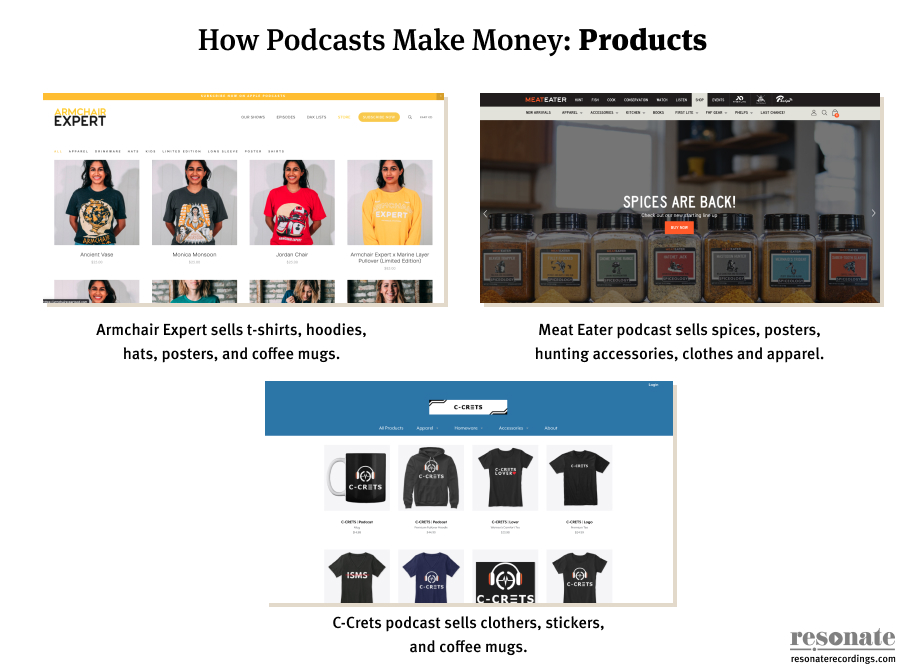
Another method to monetize your podcast is to sell brand merchandise. From t-shirts to coffee mugs and stickers, merchandise can add another stream of income.
Examples of podcast products and merchandise
- T-shirts
- Hoodies
- Hats and beanies
- Coffee mugs and tumblers
- Posters
- Stickers
- Ebooks
- Books
Example Podcasters
- C-Crets – Selling t-shirts, stickers, and podcast-branded merch
- The Meat Eater – Selling spices, posters, books, clothes, pocket knives, and hunting accessories
- Armchair Expert – Selling t-shirts, hoodies, posters, coffee mugs and tumblers, hats, and even a little baby outfit
How to monetize your podcast with products and merchandise
For most people, selling branded products simply isn’t going to support you and your family, so it should probably be looked at as a subsidiary strategy. However, merchandise is a wonderful marketing tool. You could offer free merchandise if people give you a shoutout on their social media, or if they sign up for your email newsletter. Plus, if people walk around in your merchandise they may reach even more people with your podcast. Use products to monetize and market your podcast.
Cross media
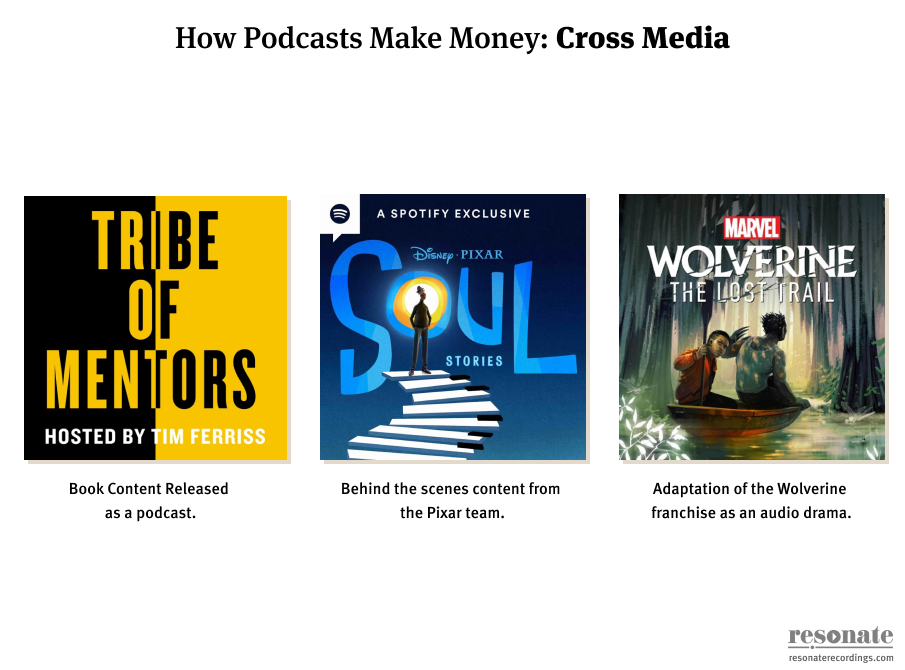
Cross Media monetization is the method of using your podcast to test and market other intellectual properly like books, films, blogs, audiobooks, and courses. This is a less direct method of monetization but can be very powerful for creating truly impactful resources that will sell.
Examples of cross media
- Books – Test out content from your book in conversation with guests and study your engagement analytics to see how listeners enjoy it. Read parts of your book or discuss the content you share in your book to drive interest. Tribe of Mentors by Tim Ferris is an excellent example of a podcast that shares ideas and snippets from his book.
- Audiobooks – Publish the first chapter or two of your audiobook as an episode of your podcast to give listeners a free trial, test performance before it’s released, and drive sales.
- Films – Create a spin-off podcast to share behind the scenes of the movie, turn your movie/short film into an audio drama. Market your movie in the podcast medium and push more traffic to the movie after it has been released. A few creative examples include the Soul Stories podcast by Pixar and Marvel’s Wolverine.
- Blogs – Create a unique, highly researched blog post and record a podcast to discuss the content. You can then monetize your blog through running ads on your website, using an affiliate link to recommend something, or selling a product, digital product, or course.
- Courses – Record interviews with people who have gone through your course, share an audio version of one of your lessons, or talk about the philosophy of your course and how it is impacting others, then push listeners to sign up for the course with a discount code.
How to use your podcast to monetize from cross media
Creativity is critical when it comes to cross media marketing and monetization. The path to monetization is not always linear. But it starts with generating interest and offering true value to people. Here is a short list of creative ways to start using cross media to monetize your ideas.
- Be a guest on podcasts to talk about what you have learned while creating your book/film/blog/course and ask the audience to read your new book.
- Share previews of content on your podcast, such as putting 2 chapters of your audiobook on your podcast feed.
- Create a behind the scenes podcast, or an audio drama spinoff, of your film.
- Create a blog post that is highly valuable, like an industry survey or some kind of data or analysis, talk about it in your podcast and push viewers to read the blog.
- Share concepts from your online course, interview your students, or be a guest on another podcast to share the story of why you made your course.
Can you get paid for podcasts?
Yes. There are a lot of different ways to make money as a podcaster, but they all hinge on your audience. Here’s what you should consider before trying to monetize your podcast:
- Making money from your podcast ultimately hinges on your audience.
- Making money hinges on how much your audience trusts you, how engaged they are in your show, and how well you know who they are.
- Monetization is a complex subject in a lot of ways because it requires very careful reflection on your specific and unique set of circumstances (eg the topic of your podcast, your stance on that topic, your audience’s stance, how broad or specific your audience’s preferences are, etc).
How much do podcasters make?
Patt Flynn makes $14,018+ per month (affiliate marketing)
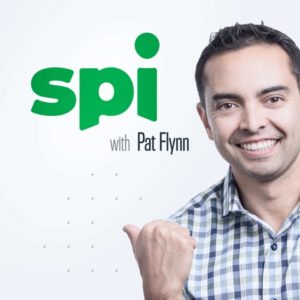
- 14,018 – one month of Affiliate income
- 2,670 from book affiliate links (all time)
- Pat says, “I’ve generated over $350,000 in advertising revenue since 2014 when I began, but I’ve had some issues with it over time.”
Darknet Diaries makes $15,429+ per month (Patreon)
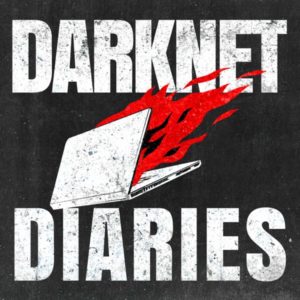
Jack Rhysider, host of Darknet Diaries, publicly displays his monthly Patreon revenue on his page. This income doesn’t include revenue he makes from sponsors he mentions in his show notes, so he likely makes even more than this on his podcast as a whole.
Tim Ferris makes $3M per year (programmatic advertising)

Jack, the host of Darknet Diaries listed above, estimates that Tim Ferris makes $3 million per year on his podcast alone. Tim Ferris is sponsored by many brands and constantly recommends products using affiliate links as well.
How much money can you make?
How much you are able to make as a podcaster will ultimately come down to how hard you work, how passionate you are, and how much you invest into your audience. Serving your audience something that they love is critical to making money as a podcaster. Once you have an audience, there are dozens of creative ways to start making money.
So let’s dive into the specific techniques and tools you can use to monetize your show.
Conclusion
The hard truth is that there is no shortcut to making money on your podcast. Just like YouTube and blogging, monetizing a podcast takes both time and effort. But, we hope that this blog has shown you how many creative ways there are to create revenue streams from your podcast. Podcast ads are the most popular and exciting way to make money on your podcast, but they simply are not the only method.
The best monetization strategy starts with a loyal audience that is tuned in to the podcast. So please don’t neglect to invest in the quality of your podcast.
Are you ready to start a podcast so you can take steps toward monetizing a show? Resonate exists to make podcasting easier. Schedule a call to learn more or get started now.
